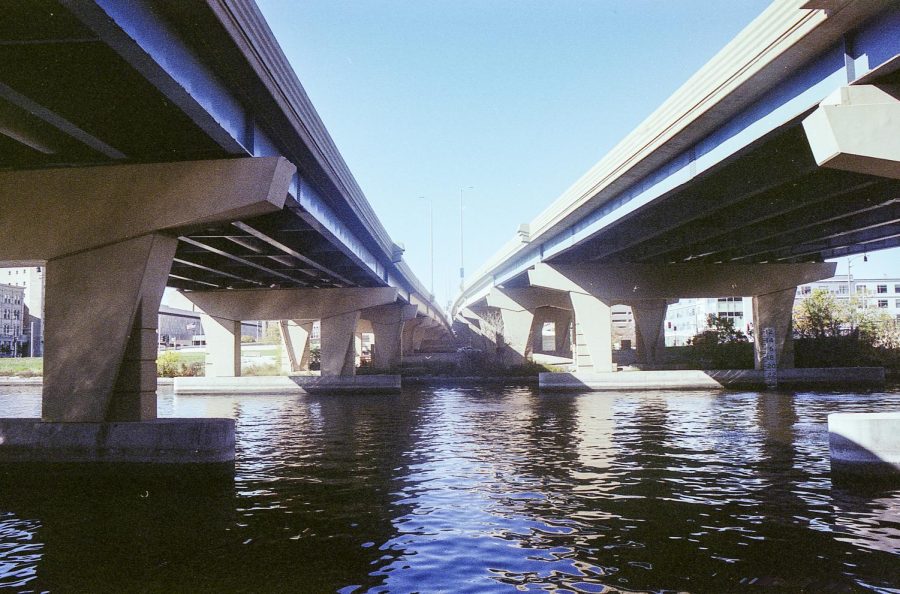When word broke from Komatsu manufacturers that there was oil leaking out through a stormwater outfall into the Menomonee River, Komatsu initially thought it was a small leak. But it was soon understood that this leak was a spill of 400 gallons of oil into the Menomonee River.
David Strifling, Director of Water Law & Policy Initiative at Marquette Law School, said Komatsu is required to contact state and federal agencies.
“The first calls have to be to the Department of Natural Resources and Environmental Protection Agency, there is a law in Wisconsin called the Spills Law. But in terms of notifying the city and the fire department … I am not aware that that is required under any local laws,” Strifling said.
Strifling said along with contacting officials they also have to financially be responsible for cleaning it up under Wisconsin law. Komatsu has sent out multiple boats along the river with booms, which are tied to the back of the boats and absorb the oil. Komatsu reports that they have been able to recover 80% of the oil.
In a statement released from Komatsu Dec. 13, the way the events unfolded was a used transfer oil error where “the used oil that was spilled is reported to be a combination of spent cutting, hydraulic and lubrication oils generated from our manufacturing process.” link this statement
Russell Cuhel, senior scientist for University of Wisconsin-Milwaukee’s freshwater sciences, said that although these types of oils are bad, they are not as bad as crude oil like the ones released in the Exxon Valdez oil spill.
“People typically associate oil spills with fuel oil and/or crude petroleum products. Where this oil is actually highly refined and contains far less environmentally isolating components,” Cuhel said.
This means that eventually the oil will biodegrade, Cuhel said. Bacteria that exist in the water will eventually break down the oil. But the issue with the winter is that the bacteria works slower than it would in the summer.
The freezing cold temperatures also affects the fluidity of the oil. Cuhel said the oil is much like Crisco, in the sense that when it is cold it becomes thick but when it is warm it flows like water.
Cheryl Nenn, Milwaukee riverkeeper, is concerned with the oil that will sink to the bottom of the river.
The organization, Milwaukee Riverkeeper relies on the people of the community to report spills and river pollution. Nenn said that because the spill was on a Friday, there weren’t many eyes on the river which meant they didn’t start getting calls until Monday.
“We are a relatively small staff and really do rely on others to solve these problems,” Nenn said. “This time of the year it’s a little bit harder because things are frozen. In some cases, there still are storm water issues but less eyes and ears means we might not be picking up on some of the issues that are happening.”
Nenn said much of this could’ve been avoided had Komatsu immediately called local authorities.
“Had they called 911 immediately or the City of Milwaukee, they would have sent the fire department or Milwaukee has emergency oil response plans and materials for this type of event. There could’ve been a more coordinated and effective response that would’ve minimized the damage to water quality and water life,” Nenn said.
The quicker the response, the easier it is to effectively take action. The slower the response, the larger impact it has on the environment, Nenn said.
Images and videos surfaced on the internet of the oil sheen in the water. Then when Milwaukee Riverkeeper released a statement on the spill was when media coverage really took off.
Seiches, which are events that occur on Lake Michigan when winds push around waters, moved the oil from the Menomonee to other areas of the Milwaukee River Basin. This oil eventually ends up in Lake Michigan, where Milwaukee gets its drinking water.
Wildlife has also been affected by the spill. Dec. 8, a snowy owl was found saturated with oil and recovered by the Wisconsin Humane Society.
“The Snowy Owl continues to recover from her injuries at the Wildlife Rehabilitation Center. She is making a slow but steady recovery. While we are hopeful she’ll be releasable, it’s still too early in her healing process for us to know for sure. We expect her to be in care at least until late February if all goes well, as she’ll still need flight reconditioning,” Angela Speed, vice president of communications at Wisconsin Humane Society, said in an email.
Nenn recommends students volunteer to help out and keep track of the river. She also is hoping for more transparency from large companies when it comes to these types of accidents.
Milwaukee Riverkeeper is scheduling a cleanup in the spring on April 23, where people can come out to help clean and make our waterways safe. For more information visit the Milwaukee Riverkeeper.
This article was written by Connor Baldwin. He can be reached at [email protected]






